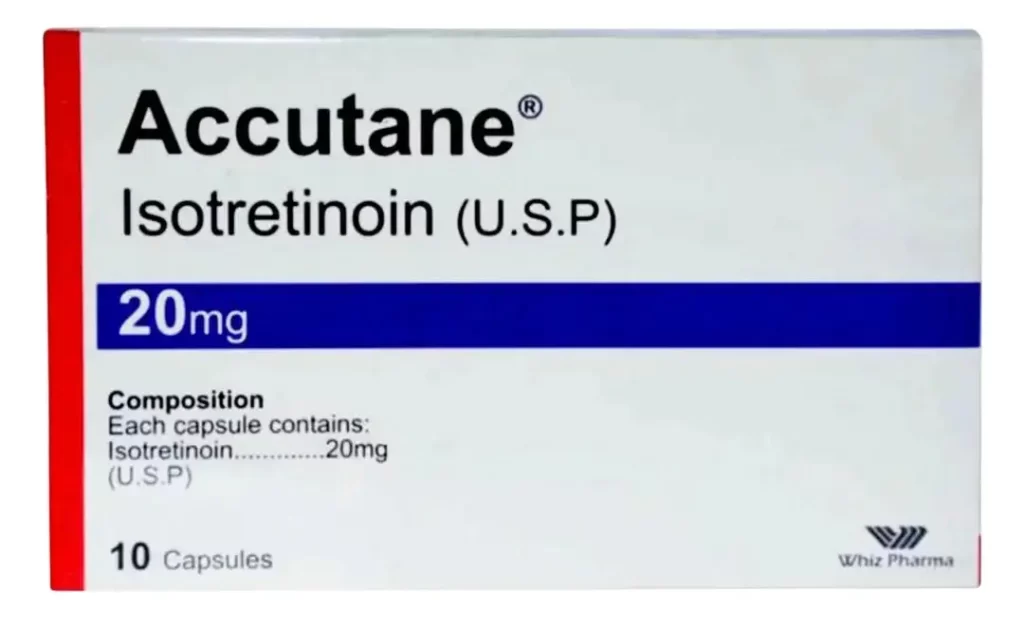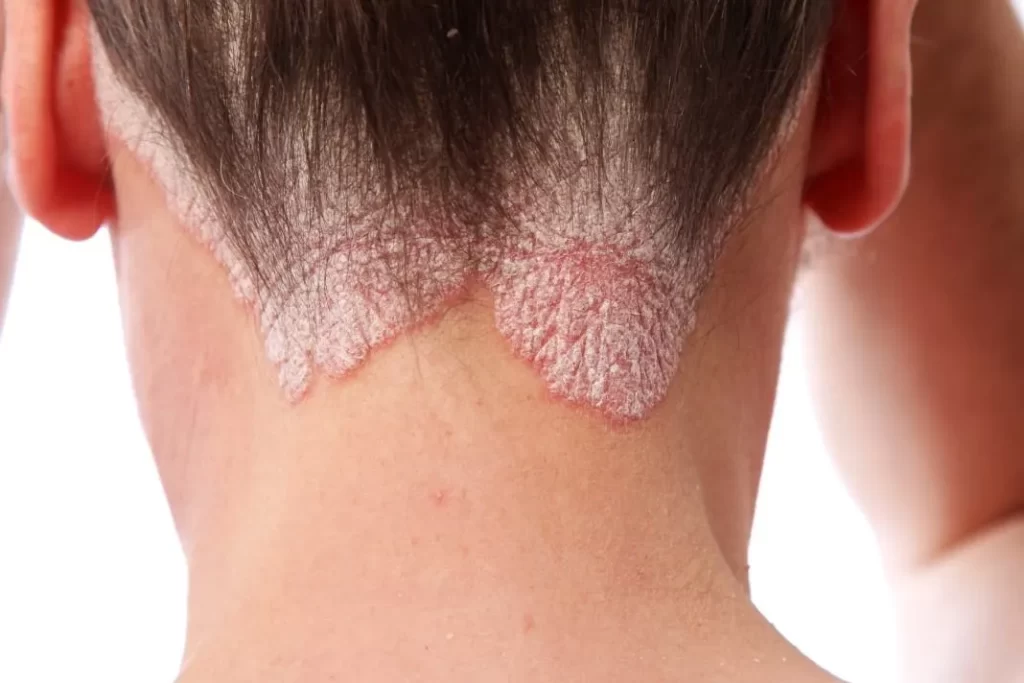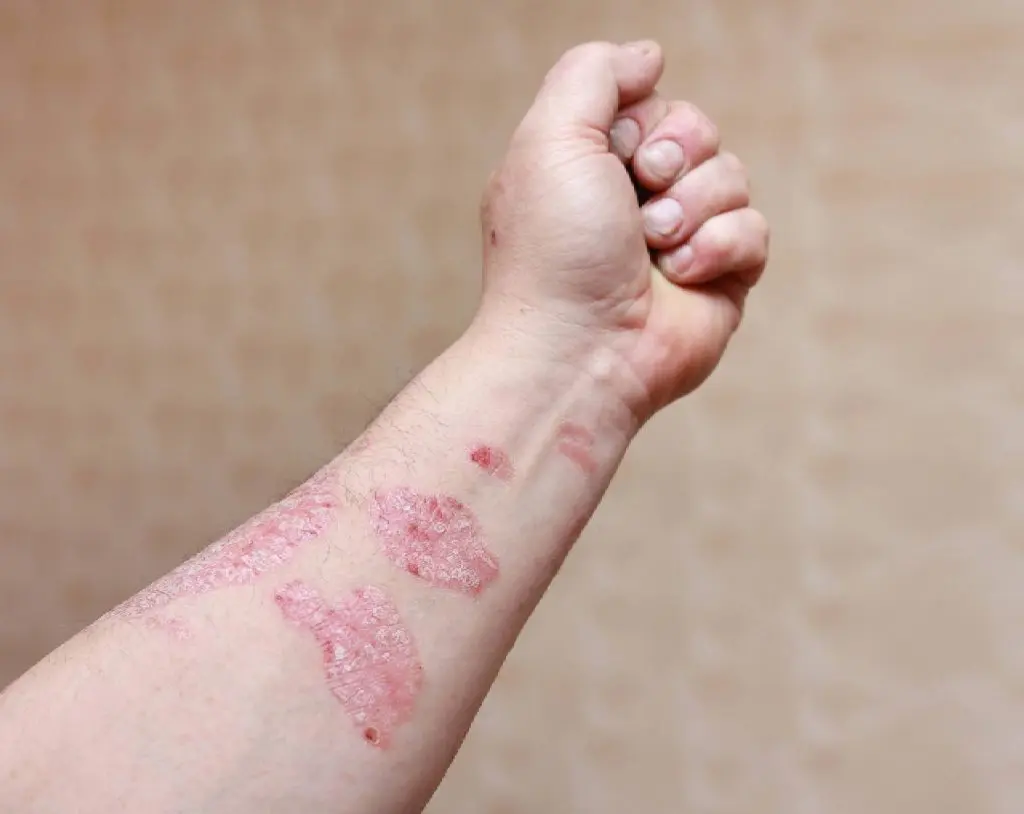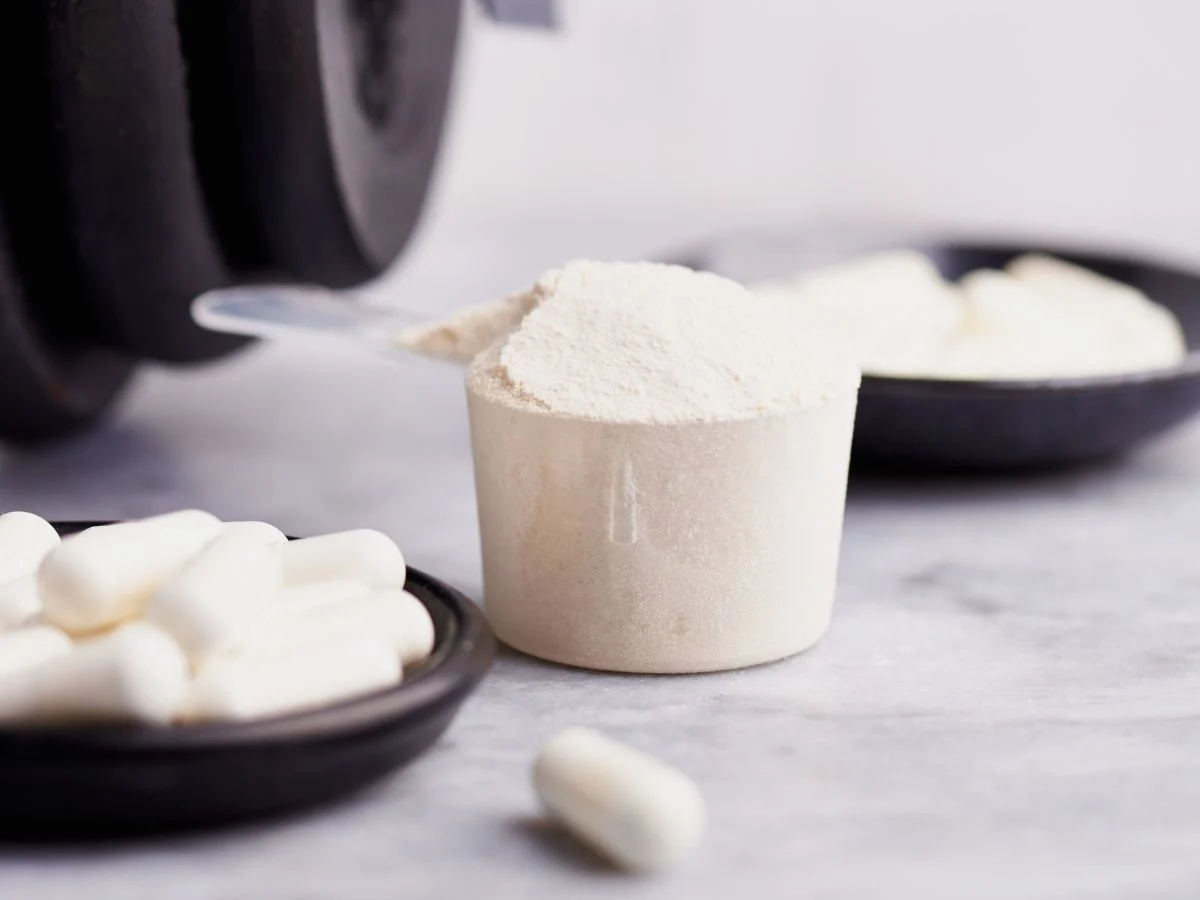Accutane does not directly cause psoriasis, but in some rare cases, it can trigger or make it worse in people who already have a risk for the condition. The link between Accutane and psoriasis comes from how isotretinoin affects skin renewal and the immune system.
These changes can sometimes lead to too much inflammation. Most patients take Accutane safely for severe or cystic acne; however, anyone with a family history of psoriasis should inform their dermatologist before starting treatment.
If you notice new redness, itching, or scaly skin while on Accutane, see a doctor right away to check if it’s irritation or an early psoriasis flare.
At DermOnDemand, board-certified dermatologist Dr. Hannah Kopelman explains that knowing how Accutane interacts with skin inflammation is key to safe treatment and long-term skin health.
Key Takeaways
- Accutane does not directly cause psoriasis, but in rare cases, it can trigger or worsen the condition in people with a genetic or family history of psoriasis.
- The link between Accutane and psoriasis lies in how isotretinoin alters skin renewal and immune responses, which can sometimes lead to overstimulated inflammation.
- Acitretin is the retinoid approved for psoriasis treatment, while Accutane targets oil production for acne and may disrupt skin balance instead of improving it.
- If new redness, scaling, or itching develops during Accutane therapy, a dermatologist should evaluate whether it’s irritation or a psoriasis flare.
- DermOnDemand, led by Dr. Hannah Kopelman, offers fast, expert online care for managing acne, psoriasis, and other skin reactions safely and effectively.
How Accutane Affects Psoriasis
Can Accutane cause or worsen psoriasis?
Yes, Accutane can sometimes trigger or worsen psoriasis, though this is rare. Isotretinoin alters the growth and shedding of skin cells.
In some individuals, it can overstimulate the immune system, leading to red, scaly patches on the scalp, arms, or torso. These flare-ups often appear within a few weeks of starting treatment. See a dermatologist quickly if this happens so they can adjust your plan and reduce irritation.
Is psoriasis a side effect of Accutane?
Psoriasis is not a usual side effect of Accutane, but a few medical reports describe it appearing in some patients taking isotretinoin. This may be due to immune changes or interactions with other medications.
Individuals with psoriasis or a family history of the condition may be more susceptible to this reaction. If new itching or scaly areas appear while taking Accutane, consult a dermatologist. They can help find out whether it’s psoriasis or a normal response to the medication.
What studies reveal about isotretinoin and inflammation
Studies show mixed results. Some research suggests that isotretinoin reduces inflammation in acne, while other reports link it to the development of new psoriasis in certain patients.
These differences show why each treatment must be tailored. A dermatologist should always review a patient’s skin history before prescribing Accutane.
Understanding Why Accutane Can Trigger Psoriasis
Accutane affects how the body controls skin cell growth and immune signals. When the drug slows oil production, it can also weaken the skin barrier, making it more susceptible to damage. This can activate immune cells in individuals who already have a genetic predisposition to psoriasis.
Other triggers, such as stress, cold weather, or infection, can exacerbate the reaction. Dr. Hannah Kopelman notes that early care and good skin habits can prevent flares and make treatment safer.

How to Tell the Difference Between Psoriasis and Accutane Side Effects
Dryness and redness are common side effects of Accutane and can resemble the symptoms of psoriasis. The difference is where and how the irritation appears. Typical side effects include even peeling on the face, which typically improves with the use of moisturizer.
Psoriasis causes thick, scaly patches that appear on areas like the scalp, elbows, or knees. If new spots appear outside acne areas or don’t heal with gentle care, take photos and share them with your dermatologist for review.
Types of Psoriasis Linked to Accutane
Scalp psoriasis: symptoms and triggers
Accutane can cause the scalp to dry out, which may trigger inflammation in individuals who are sensitive to it. Symptoms include flaking, redness, and burning along the hairline.
Use gentle, fragrance-free shampoos and hydrating products to ease dryness. If symptoms continue, ask your dermatologist about short-term topical treatments.
Nail psoriasis: early signs and care tips
Some patients notice nail changes while taking Accutane, such as small pits or nails that lift from the nail bed. These signs often indicate nail psoriasis, rather than an infection.
Keep nails trimmed and moisturized. Avoid harsh nail products and frequent water exposure. If symptoms worsen, consult your dermatologist about medicated nail solutions.
When flares indicate irritation, not improvement
Flaky or itchy spots can sometimes resemble healing acne irritation, but if redness or scaling spreads beyond the acne areas, it may be a sign of psoriasis. Keeping track of when symptoms appear can help your dermatologist decide whether to continue or adjust your medication.
Accutane vs. Acitretin: Key Differences
Why acitretin treats psoriasis, but Accutane may not
Acitretin and Accutane belong to the same drug family, but they work differently. Acitretin slows the growth of skin cells, which helps control psoriasis. Accutane primarily reduces oil and inflammation associated with acne.
Using Accutane for psoriasis can disrupt skin balance, rather than improving it, and sometimes leads to irritation or flare-ups.
Can Accutane help psoriasis in mild cases?
A few reports suggest that Accutane may help alleviate mild psoriasis due to its anti-inflammatory properties, although this result is rare. Dr. Hannah Kopelman explains that the risks often outweigh the benefits. Other options, such as acitretin or topical creams, are safer and more effective in the long term for managing psoriasis.
Key safety considerations for both retinoids
Both drugs can cause dry skin, chapped lips, and sensitivity to sunlight. Neither should be taken during pregnancy because they can cause congenital disabilities.
Blood tests and contraception are needed during and after treatment. Dr. Kopelman emphasizes the importance of medical supervision to ensure patient safety and optimal treatment outcomes.
Medications That May Worsen Psoriasis
Retinoids, beta-blockers, and common triggers
Some drugs can make psoriasis worse. These include beta-blockers for blood pressure, lithium for mood disorders, and some antimalarials. Even other retinoids or antibiotics can cause problems when mixed without care.
Recognizing drug-induced psoriasis
If psoriasis appears shortly after starting a new medication, it may be a side effect of the medication. These symptoms usually fade once the drug is stopped. Keep a list of your prescriptions and share it with your dermatologist to spot the cause quickly.
Safer alternatives to discuss with your doctor
If a medicine is causing psoriasis, your dermatologist may switch you to safer options or add treatments like light therapy or topical steroids. Never stop medication on your own. Always follow your doctor’s advice to manage both acne and psoriasis effectively.
Treating Psoriasis During Accutane

How to manage psoriasis without stopping Accutane
If psoriasis appears during Accutane, dermatologists can often manage it without stopping the medication. Using gentle moisturizers and mild steroid creams can calm the skin while acne treatment continues. Avoid harsh toners or alcohol-based products to protect the skin barrier.
When to pause or adjust treatment
If psoriasis becomes severe, characterized by widespread redness, thick scales, or joint pain, your doctor may recommend pausing Accutane. Once your skin improves, they can restart it at a lower dose or switch to another medication. This step-by-step approach helps keep both acne and psoriasis under control.
Prevention tips for scalp, nails, and skin
To lower the chance of flare-ups:
- Use mild, fragrance-free cleansers and daily moisturizers.
- Take short, lukewarm showers to avoid dryness.
- Apply sunscreen daily, since Accutane increases sun sensitivity.
- Get enough sleep, drink plenty of water, and manage stress, as these habits help balance your immune system.
When to Stop Accutane and Seek Medical Help
If psoriasis becomes painful, spreads fast, or makes daily tasks difficult, you may need to pause Accutane. Warning signs include cracked skin that bleeds, severe itching, or stiff joints.
Don’t stop suddenly on your own, as it can cause acne to return. Contact your dermatologist so they can adjust your plan safely and treat symptoms early.
When to See an Online Dermatologist
Fast evaluation and prescription in 24 hours
If psoriasis symptoms start during Accutane treatment, prompt treatment can help prevent complications. Explore dermatologist-led acne treatment options to ensure your care plan is both safe and effective.
With DermOnDemand, you can complete a secure form and upload photos for review. A board-certified dermatologist will review your case and send a treatment plan within about 24 hours.
Private, expert-led dermatology care through DermOnDemand
DermOnDemand provides private and professional dermatology care from the comfort of your own home.
Each case is reviewed by specialists like Dr. Hannah Kopelman, who focuses on acne, psoriasis, and complex skin conditions. This digital approach enables patients to receive expert care quickly, eliminating the need for an in-office visit.
Post-Treatment Skin Recovery After Accutane
After finishing Accutane, the skin stays sensitive for several weeks as it recovers its natural moisture. Use gentle cleansers, hydrating creams, and daily sunscreen to protect your skin.
If psoriasis or dryness persists, consult your dermatologist to rule out a flare-up. DermOnDemand provides ongoing support and personalized care to help your skin stay healthy after treatment.
Accutane remains an effective option for severe or cystic acne, but it requires awareness and monitoring. Understanding how isotretinoin affects the immune system, recognizing the early signs of psoriasis, and seeking professional help promptly are essential for achieving safe and effective results.
With guidance from DermOnDemand and experts like Dr. Hannah Kopelman, patients can safely and confidently manage both acne and psoriasis.
Ready for Expert Skin Care You Can Trust?
If you’re experiencing psoriasis symptoms during Accutane treatment, don’t wait for them to worsen; seek medical attention immediately. Get fast, dermatologist-led care from DermOnDemand, no video calls or waiting rooms.
Complete your secure online visit today and receive a personalized prescription plan within 24 hours from Dr. Hannah Kopelman and her team of board-certified dermatologists.







